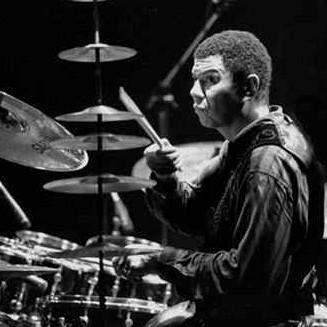
Jack DeJohnette
by Chris KelseyAt his best, Jack DeJohnette is one of the most consistently inventive jazz percussionists extant. DeJohnettes style is wide-ranging, yet while capable of playing convincingly in any modern idiom, he always maintains a well-defined voice. DeJohnette has a remarkably fluid relationship to pulse. His time is excellent; even as he pushes, pulls, and generally obscures the beat beyond recognition, a powerful sense of swing is ever-present. His tonal palette is huge as well; no drummer pays closer attention to the sounds that come out of his kit than DeJohnette. He possesses a comprehensive musicality rare among jazz drummers.Thats perhaps explained by the fact that, before he played the drums, DeJohnette was a pianist. From the age of four, he studied classical piano. As a teenager he became interested in blues, popular music, and jazz; Ahmad Jamal was an early influence. In his late teens, DeJohnette began playing drums, which soon became his primary instrument. In the early 60s occurred the most significant event of his young professional life — an opportunity to play with John Coltrane. In the mid-60s, DeJohnette became involved with the Chicago-based Association for the Advancement of Creative Musicians. He moved to New York in 1966, where he played again with Coltrane, and also with Jackie McLean. His big break came as a member of the very popular Charles Lloyd Quartet from 1966-1968. The drummers first record as a leader was 1968s The DeJohnette Complex. In 1969, DeJohnette replaced Tony Williams in Miles Davis band; later that year, he played on the trumpeters seminal jazz-rock recording Bitches Brew. DeJohnette left Davis in 1972 and began working more frequently as a leader. In the 70s and 80s, DeJohnette became something like a house drummer for ECM, recording both as leader and sideman with such label mainstays as Jan Garbarek, Kenny Wheeler, and Pat Metheny. DeJohnettes first band was Compost; his later, more successful bands were Directions and Special Edition. The eclectic, avant-fusion Directions was originally comprised of the bassist Mike Richmond, guitarist John Abercrombie, and saxophonist Alex Foster. In a subsequent incarnation — called, appropriately, New Directions — bassist Eddie Gomez replaced Richmond and trumpeter Lester Bowie replaced Foster. From the mid-70s, Directions recorded several albums in its twin guises for ECM. Beginning in 1979, DeJohnette also led Special Edition, a more straightforwardly swinging unit that featured saxophonists David Murray and Arthur Blythe. For a time, both groups existed simultaneously; Special Edition would eventually become the drummers performance medium of choice. The band began life as an acoustic free jazz ensemble, featuring the drummers esoteric takes on the mainstream. It evolved into something quite different, as DeJohnettes conception changed into something considerably more commercial; with the addition of electric guitars and keyboards, DeJohnette began playing what is essentially a very loud, backbeat-oriented — though sophisticated — instrumental pop music. To be fair, DeJohnettes fusion efforts are miles ahead of most others. His abilities as a groove-centered drummer are considerable, but one misses the subtle colorations of his acoustic work. That side of DeJohnette is shown to good effect in his work with Keith Jarretts Standards trio, and in his occasional meetings with Abercrombie and Dave Holland in the Gateway trio. DeJohnette remains a vital artist and continues to release albums such as Peace Time on Kindred Rhythm in 2007.
